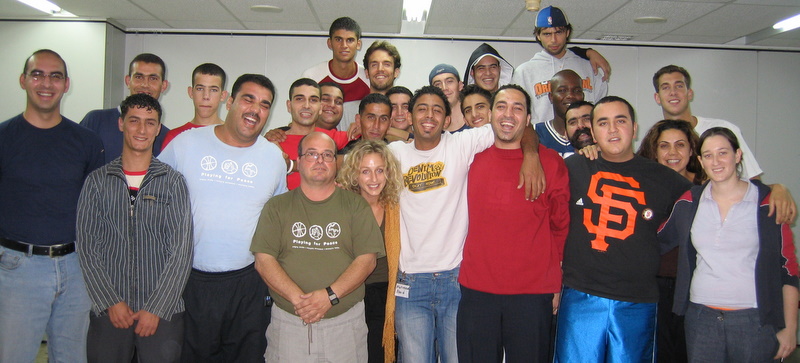Posts from the West Bank in 2006
A series of blog posts capturing the first few months of joining a peace non-profit in the West Bank and Israel. First published on TrueHoop.
Our Man in the Middle East
Thursday, August 10, 2006
Intro by Henry Abbott, TrueHoop blog founder:
Brian Sigafoos graduated from Harvard with honors in 2003, and has since played professional basketball in Portugal, Denmark, the USBL, and Taiwan. After being recruited by Harvard and cut from the team as a freshman, Brian rededicated himself to basketball and was the starting center by midway through his sophomore season. Brian has also coached at various levels, peer mentored disadvantaged kids in Boston, and taught social entrepreneurship to teenagers in Philadelphia. Brian is passionate about the Playing for Peace mission and about returning to the Middle East (he lived in Beirut, Lebanon for a month while recovering from an injury) to meet the challenges of making our program a success in Israel and the West Bank.
After I wrote about Chad Ford’s experience with Playing for Peace (and a follow-up), I met Brian, along with Playing for Peace Founder Sean Tuohey, in my office last week. Brian has just bought a ticket, and was endeavoring to spend a year in Israel and the West Bank as a Program Director for Playing for Peace.
One thing you should know: he’s tall. Like seven-feet tall.
I asked him to give us installments from his trip, with the “real and gritty” details with a true sense of what he’s going to be doing in Israel and the West Bank with Playing for Peace (PfP).
Note: I was going to link the place names to Google maps. But guess what! Google maps isn’t showing detailed maps of that part of the world these days, and who can blame them. Here’s an OK map in the interim. All photos and text by Brian Sigafoos.
Uncertain
So to start with I should probably say that I am leaving this Sunday without any official connection to Playing for Peace (PfP). We were supposed to leave August 2nd, but then this war between Hezbollah and Israel erupted and the whole situation looks real ugly on CNN and MSNBC. Talking heads on TV calling this the beginning of WWIII hasn’t helped. Now PfP is waiting and seeing what will happen. They have grown into a large non-profit with a board of trustees and worries about liability. I understand their need to postpone making a decision, but I couldn’t wait any longer.
Matt Minoff (last year’s managing director, Yale ‘04, played in Maccabi Rishon last year) will come over August 22nd and he’ll decide then whether it’s safe enough in the areas we work for the PfP to be active this year.
I could have waited until then. That might be the prudent thing to do. But I’ve been excited about PfP since January, and last Tuesday (August 1) I discovered Sean Tuohey (the founder) is heading over on Sunday. So with five days notice I bought my ticket and I’m ready to go.
Without saying much more I can say that his trip over is just as “unofficial” as mine. Sean feels like he needs to go now and see for himself what’s going on and let people know that PfP is still there for them and would send everyone as soon as they could. I can’t pass up the chance to travel with the guy who built the whole organization up, and lived in Ramallah setting up PfP’s West Bank operations. What better introduction to the region, staff, and kids could I have?
Getting on a Plane
Sitting in the airport I feel like all the other times I’ve flown overseas. The difference, as everyone reminds me, is that I’m traveling to a “war zone.” Our rough schedule for my first seven days in Israel and Palestine will be to stay in Tel Aviv for one night, then travel to visit the areas where we work: Jericho, Ramallah, TulKarm, and Jerusalem.
We will try and guage the sentiment in the West Bank. We want to be there this year. But Hezbollah’s military campaign and Israel’s destruction of Lebanon’s infrastructure may have changed the dynamic on the ground. Will Jericho, Ramallah, and TulKarm be safe for a bunch of American “do-gooders,” as Henry says?
I’ve heard the places we go, coaches we train, and kids we teach hoop to all desperately want us there. But will the fact that it’s American planes and American bombs (sold to the Israeli army) that are destroying Hezbollah (and Lebanon) in order to create a sustainable peace make any difference?
The plane is 1/3 full from London to Tel Aviv and I chat with a woman who used to live up near the northern border with Lebanon but is now going to stay with her daughter in Tel Aviv until it’s safe to return. Six Katyusha rockets have fallen in her small village. She tells me it’s not safe to drive because “they hit cars now” on the roads in the North.
Tel Aviv: No Sign of War
Once I land in Israel, any sense I have that there is an ongoing war is quickly erased. It doesn’t leave the back of my mind, but as far as I can tell life is going on as normal. We head to our apartment in Rishon (our apartment, in a city in between Tel Aviv and Jerusalem) and to the Rishon Country Club which is pretty much what it sounds like. At 6pm at night the place is packed, with people lifting weights, swimming in two pools, sun bathing, playing tennis, and relaxing in the sauna.
Photo: Cafe in Rishon
War, what war? Life goes on. That night we head to a mellow reggae jam session at a bar in Herzliya on the beach, just north of Tel Aviv. It’s the same. Rich, young, very attractive Israelis enjoy the fresh Mediterranean breeze and incredibly good seven-member reggae band.
Later, in the home of an Israeli surfer friend of Sean’s, we discuss what’s going on. “Israel has no choice.” “What else can we do?” he asks. Israel is surrounded on by people who want to destroy it.
Maybe Israel’s harsh, collective punishment of Lebanon is necessary to deter future aggression. We get the sense that, in the beginning, the current conflict was on everyone’s minds, but now it has become something they live with. It blends into the background noise of daily attacks and counterattacks in Gaza, that are taken for granted. We joke about CNN’s Paula Zhan’s coverage of “Is Armageddeon upon us?” No one we speak with seems afraid Tel Aviv will be hit by a rocket. Or they aren’t worried at least. Only 50 miles from where 200 Katyusha rockets land a day, where I’m sure it’s on people’s minds, we don’t talk to anyone who is really worried.
Photo: Playing for Peace Founder Sean Tuohey waits for a ride to Ramallah
Israelis, like Americans, are able to live a comfortable life even while fighting a war. While the news covers it endlessly, the people still work, play, drink and party.
More to the Story
Tomorrow may show us another perspective as we visit a Palestinian PfP coach in Beit Safafa, East Jerusalem, and head on to Ramallah in the West Bank where we’ll spend the night. My sense is that things will be different in the West Bank, where life isn’t nearly as comfortable (a gross understatement), and the Arab TV stations carry their version of war, carnage, and Israeli/American aggression and injustice.
Big Man in the West Bank
Sunday, August 13, 2006
Welcome to the West Bank
From Jerusalem Sean and I arrange a ride to Ramallah with Ghassan, a local PfP coach. The path is not easy or obvious, even for Palestinians who drive it regularly, because of multiple checkpoints and roadblocks—literally giant stones blocking the road. They are no detour signs. Ghassan navigates us hit-or-miss through small residential streets with large speed bumps and potholes to circumvent the roadblocks. We follow the wall built to separate Israel from the West Bank and end up doubling back half a mile (along with ten other cars following our same route) because some more giant stones are strewn across the street.
Getting closer to Ramallah, we join a long line of cars and trucks inching forward to a new temporary checkpoint, just out of sight around a bend in the road. We come to a halt as the Israeli soldiers manning the checkpoint close the road to vehicle traffic. A stream of taxis pull up and let out their passengers who try their luck walking through the checkpoint and finding another taxi on the other side. A large truck next to my window spews a black cloud of diesel exhaust over us for the next 20 minutes as we sit and wait.
I naively ask Ghassan what he thinks is going on, if there is some unusual militant activity or a pro-Hezbollah rally. He laughs and says that “this is nothing, this is normal.” He interprets the Israeli soldiers’ actions: “They were bored so they make a checkpoint. And when they see that everyone waits and traffic is backed up enough, they let everyone go. There is no reason.” As Ghassan reiterates the need to be patient we hear five gunshots in quick succession and a small explosion. We cannot see what happened, but some cars and trucks begin figuring out how to make a u-turn in bumper-to-bumper traffic. We contemplate turning around too when five minutes later traffic suddenly begins moving again. As if nothing happened, we ease past four young Israeli soldiers who are no longer interested checking the traffic.
In Ramallah, we meet with Nader at the Orthodox Sports Club. The club treats us to pizza and beer—as a Christian club it is one of the few places you can get a pint of beer after a game in all of the West Bank.
Why Not?
We discuss the war and PfP’s hesitation to send anyone over because of uncertainty about the conflict widening (Sean and I both came over unofficially, on our own). Some more Palestinians from Ramallah join our discussion and information gathering session. They do not see what the current conflict between Israel and Hezbollah has to do with them and why PfP might not return. Sean says that if Tel Aviv is hit by a rocket, the four Americans PfP has hired to be program directors will be not sent. There is no consensus on whether Tel Aviv will be hit, but all insist that such an event would not affect PfP program directors living and working in Jerusalem and the West Bank. No terrorist group or Muslim nation, including Syria and Iran, would ever risk damaging the Temple Mount in Jerusalem. Not only the holiest site in Judaism, the Temple Mount is the third holiest site in Islam (known as the Noble Sanctuary by Muslims, it includes the Al-Aqsa Mosque and the Dome of the Rock.) Our Palestinian hosts cite Nasrallah’s warning for Arabs to leave Haifa as evidence that Ramallah, and much of the Palestinian areas of the West Bank, are safe from longer range rockets.
After we eat, Sean and I run an impromptu basketball practice for about ten kids before a growing crowd of interested onlookers. Their enthusiasm is evident even if their fundamentals are not.
Photo: Issiwiya shooting form. Photo: The art of the dribble
An Invitation
Our host, Nader, coaches the men’s team at Orthodox Sporting Club (half the team is Muslim) and begins to recruit me to play for him. When Nader learns about my situation (not having an official job or place to stay) and that Sean is only here for five days, he insists I stay in Ramallah with him and play for Orthodox. We also discuss where we can expand PfP in Ramallah. Nader promises to show us four Palestinian refugee camps within walking distance of one another.
Without exception, all the Palestinians we have met are kind, helpful, and giving. We stay in the Al-Hajal hotel in Ramallah overnight. Wednesday morning, I find myself awake at five am and take a walking tour of the city. I wander into a bakery before it opens and the two men inside, Ashraf and Ali, seeing that I am a foreigner, offer me breakfast and make me feel welcome. I share their pot of sweet mint tea and dunk just about every type of bread they have into my cup.
Photo: Ali and Ashraf
Sean and I next take the bus from Ramallah to Tulkarm and the bus ride is uneventful. In Tulkarm, Issiwiya, and Beit Safafa, over the next three days, we visit our local coaches and hold small unofficial practices with some of the kids in our programs.
Photo: Playing for Peace founder Sean Tuohey addresses basketball players in Issawiya
Besides listening to the local coaches’ perspectives, we also listen to the kids. These kids are surrounded by a barrage of television images and discussions of the war. They all have their own opinions about what is going on. They might empathize more with one side than the other but they are still kids. They joke around, love to high-five, and get fired up in competitive situations. During the practice sessions, their enthusiasm and energy is uplifting. The kids are not bashful about telling us how much they want us to be here.
I am definitely looking forward to holding some more unofficial practices next week. This weekend my plan is to get settled in Ramallah and hang out with my new teammates. After a night out in Jerusalem, our friend Samir praised the girls in Ramallah: “You just wait. What they have in Ramallah, they don’t have in all of Israel. The girls there are so nice.” My first practice with the Orthodox team is tonight and first Palestinian Basketball Federation game is next week.
Photo: Brian Sigafoos and Sean Tuohey at the Dead Sea
Brian Sigafoos and Sean Tuohey at the Dead Sea. The shorter of the two, Tuohey, is 6-3.
A Basketball Camp in Tulkarm: Photos
Tuesday, August 22, 2006
Friday, August 18th, I leave my comfortable apartment in Ramallah and return by bus to Tulkarm, to run a basketball camp at Al-Khodori College. Tulkarm is 25 miles North-West of Ramallah, and is a much more conservative and quiet town. There is a heat wave here and as I step off the air-conditioned bus into 95 degrees with 70% humidity, I seriously doubt my new jeans-only approach to dressing. As far as I can tell only children and foreigners wear shorts in Israel and the West Bank. So in my effort to stand out less, and stop having people call to me in English from across the street, I too wear jeans and consequently sweat non-stop for the next 4 days.
The basketball camp was setup without any coordination from PfP by our local director and Al-Khodori College administrator–the wonderful Maha. She wanted to make sure the kids, most from refugee camps near Tulkarm, did not have too big of a gap in their basketball training while PfP delayed the start of its operations.
Photo: Basketball Camp in Tulkarm
[Click here to see an incredible slide show of Brian’s time in Tulkarm]
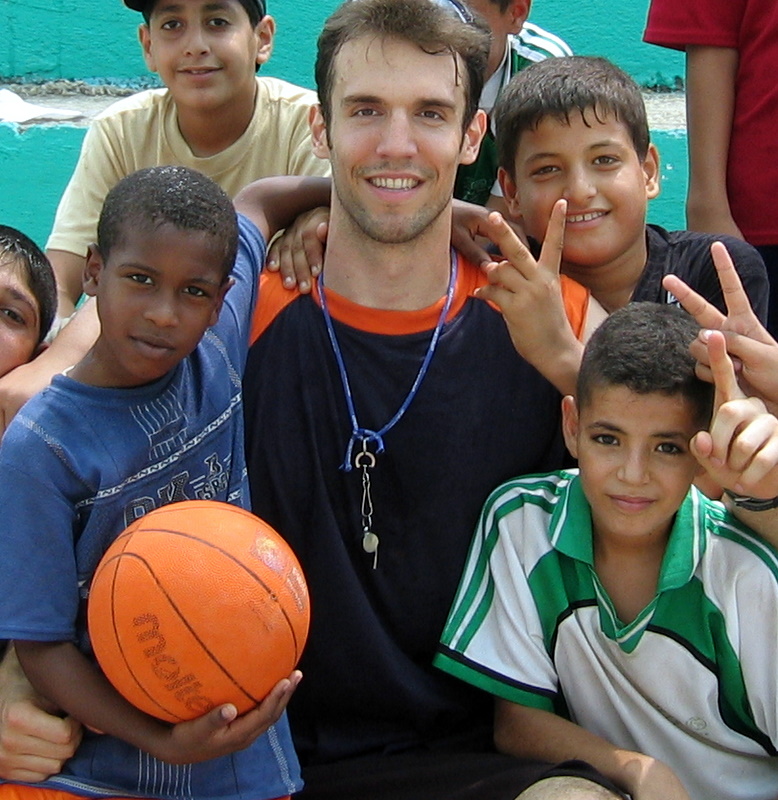
These 11-14 year old boys in Tulkarm have an enthusiasm for basketball that is contagious. During our ball-handling warm-up I show them some fun tricks to do with a basketball. Try this: hold the ball with two hands overhead; lean backwards as far as possible; throw the ball from behind your head/back so that it bounces between your legs and catch the ball in front. The kids are amazed. This quick demonstration of something fun to do with a basketball turns into 10-minutes of balls flying everywhere and lots of laughter. Only two or three players actually end up being able to do the trick, but the possibility of success keeps many of them trying again and again, even during water breaks.
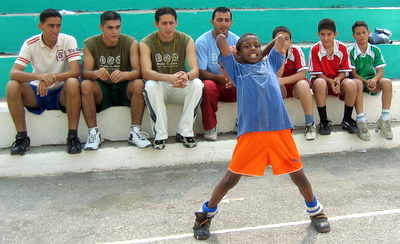
The camp does have its rough spots, and it is not all fun and laughter. My plan to move quickly from drill to drill runs into serious difficulty when many players struggle with the different footwork required for right and left hand layups. Is a full court 3-man weave with a layup is too ambitious? Let’s find out. After five minutes, mostly everyone grasps the concept of pass-and-go-behind. Unfortunately this leads to a snails pace of ten passes just to reach half court. Each player is more worried about getting behind the person he passes to than moving the ball down the court. Kids collide as their group’s forward momentum halts.
As a coach, I learn a lot from the experience. Translations of what I say are most effective when followed by myself (and the other coaches) jumping in and doing the drills with the players, to physically show how to do it, over and over. By the third day of camp, the players are flying down the court and I set goals of five passes or less from baseline to layup. The kids get it. We do stations, shooting form and defensive drills, and full-court 5-on-5. The camp is a success. I leave feeling very good about the kids progress, PfP’s local coaches, and what they have going on in Tulkarm.
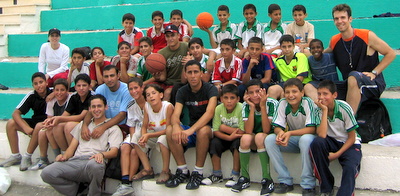
Intensity in the West Bank
Thursday, August 31, 2006
This week and last I have been playing in a basketball tournament in Ramallah with 16 teams from all over the West Bank and Jerusalem. My team is Orthodox Ramallah Club–a Christian club with a 50/50 mix of Christian and Muslim players. The tournament is hosted by Sirreyeh, a club founded in the 1920s and located in Ramallah’s Old City.
There is a lot of buzz surrounding Orthodox’s team since our coach, Nader, is Sirreyeh’s old coach and word has spread that Orthodox has an American 7-footer. Our first game is 10:30pm Tuesday, August 22nd, against Huwara, a team from a town just south of Nablus. The gym steadily fills as game-time approaches. And even though they are not playing, Sirreyeh fans arrive in force chanting and taunting Orthodox. We win 76-35 and go on to easily beat the two other teams, Beit Jala and Al Bira, in our opening-round bracket. After crusing through three games in three days by an average of 25 points we feel good but also know we have not been tested.
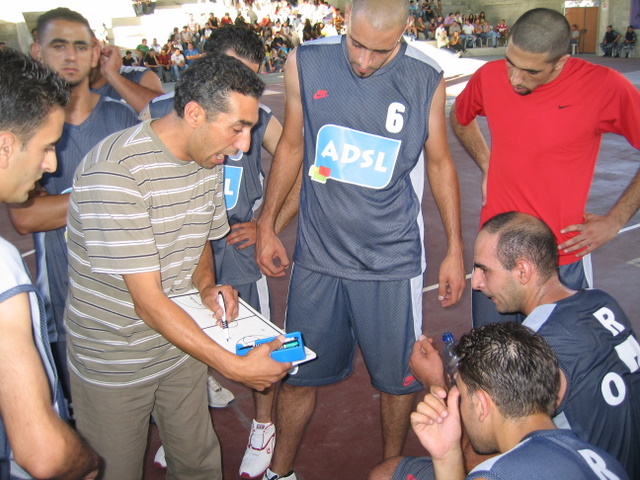
On Saturday, August 26th, we play a team from the Deheisha refugee camp in Bethlehem. We finally meet our match and lose 84-68. Their guards give ours too many problems and I enjoy battling against Deheisha’s athletic 6'10" center.
Even though our chances of winning the tournament are now slim, all that matters in Ramallah is the “derby” match-up of the crosstown rivals: Orthodox and Sirreyeh. Our game Sunday night is like nothing I have ever experienced. There are easily 1,500 people in the 1,000 seat gym, with people sitting eight rows deep on the concrete sideline and standing everywhere possible around the court. Usually there is no one behind our benches and the scorer’s table. This game there are 200 mostly VIP fans standing, sitting, and hovering around the benches. There are so many people around the court the shot-clocks in the corners of the court are practically invisible. Playing in the game I hear nothing besides the roar of the fans for most of the game. The Sirreyeh and Orthodox fans each have 200 person standing-only super-fan sections. There is no face painting or signs. Just the deafening sound of competing chants, drums, and horns that look like trumpets.
Throughout the tournament the gym is surveilled and patrolled by 10-20 police in camouflage who provide a sense of safety and control with their machine guns and large wooden clubs. The police have not been paid since Hamas came to power and international funding was cut-off. Even when it seems most are more interested in watching the game and giving me a friendly handshake, the discipline these police display impresses me. The police spring into action whenever something shady happens in the stands. Brandishing their wooden clubs they wade into the chanting, frenzied fray to pull out the troublemakers. Most Israelis I speak warn me to be careful and can hardly belive I am living, appearing in public, and even playing in Ramallah. For most of the tournament I feel very safe.
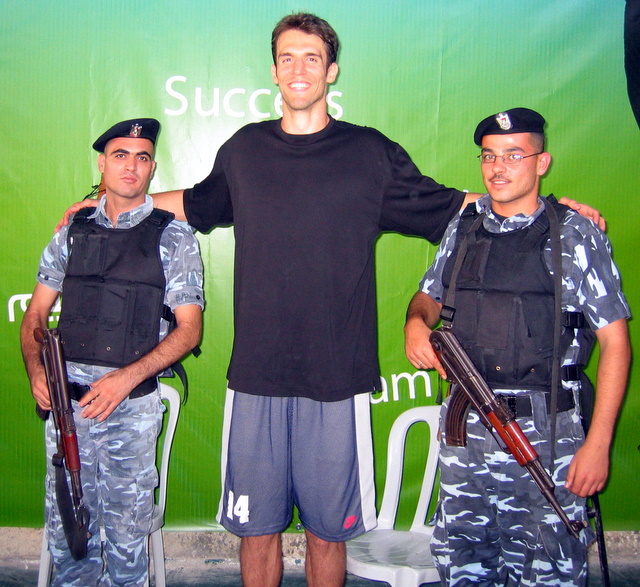
I say I feel safe only “most” of the time because of an incident in the middle of the game against Sirreyeh. The game is intense and in the third quarter the score is tied. On a freethrow one of Sirreyeh’s guards decides to antagonize me and jabs me in the back with his knee as I box him out. All the games have been physical and I had not backed down yet. In front of the ref, I turn around and demonstrate the knee-jabbing technique in the general direction of the same Sirreyeh guard’s groin. He grabs me and yells at me. I grab him and yell at him. This is nothing extraordinary or really out of place. That is until the guard reaches through the teammates seperating us and slaps me in the face. Not even a punch. He slaps my cheek?!
The sh*t hit the fan.
Fans already in a frenzy go crazy.
At least one-hundred men (young and old) swarm the court, overwhelming the police. Mini-scuffles break out everywhere between Sirreyeh and Orthodox supporters pushing and yelling each other. The super fans chant louder than ever and the drums sound like rival tribes going to war. The police raise their wooden clubs overhead and try to form a perimeter around the court to keep the remaining 1,000 fans in the stands from joining the action.
Thankfully, I do not feel like I was ever in real danger. Members of Orthodox Club and my teammates look out for me, forming a protective circle around the core of our team. Our backup center, Hamza, 6'2”–260lbs, has my back and tells me he would have hurt “the slapper” if they had not been friends.
As players we were ready to continue playing much sooner than the 10 minutes it takes to clear the court and restore any semblance of a basketball game. In the end, Sirreyeh has a better team and they outplay us in the fourth quarter. The game is hard fought, but we lose by 13. Two days later, on Wednesday night, we lose the 3rd place game to a team from Jerusalem.
Playing for Peace–Game On
I am glad to announce that, after a delay (for war), Playing for Peace - Middle East (Israel & the West Bank) is moving ahead this year as planned. I may continue to play in occasional games with Orthodox Ramallah Club (for fun), but now I am glad my days are filled with official PfP business: finding coaches, securing gyms, setting up teams, preparing to go into schools to recruit kids, apartment/office hunting in Jerusalem, and coordinating with conflict-resolution and life-skills specialists.
Palestinian Girls Playing for Peace
Tuesday, September 26, 2006
The Playing for Peace (PfP) team has assembled and we are hard at work right now. With so much going on it has been difficult for me to find time to write. Plus now instead of living by myself in Ramallah, I am sharing an apartment near night-life rich Tel Aviv with my two PfP colleagues.
Michael Vaughan-Cherubin, hereafter known as Mike, volunteered for PfP last year while taking a semester abroad at Hebrew University and earning his Masters in International Peace and Conflict Resolution from American University. Matt Quinn is a savvy 3rd year PfP vet, the “tall, boyish-looking Irish-American ballplayer” from Chad Ford’s ESPN piece.
Making up for time lost to war, we are off and running, or driving really. I am averaging above 100 miles a day, commuting from Tel Aviv to Jerusalem and visiting our sites there, plus Jericho and Ramallah. Matt, Mike and I each have our own sites and areas of responsibility, and in other posts I’ll go into more detail about what they are up to.
This is the beginning of PfP’s second full year in Israel/Palestine and we are working hard to continue and build upon the programs’ successes from last year. This means reestablishing last year’s sites and expanding them to more teams. My “sites” are the French Hill and Esawiah neighborhoods of Jerusalem and the Palestinian town of Jericho. After they are all up and running smoothly, with good local coaches, practices twice a week, and 16 players in each age group, I will look to add new sites–starting with the refugee camps around Ramallah.
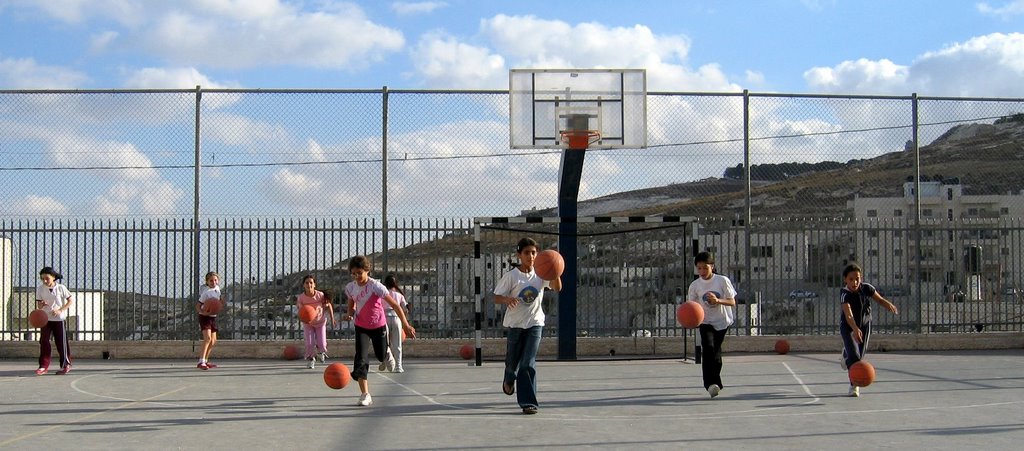
Last year in Esawiah we had 30 boys on 2 teams. This year we will have 3 boys’ teams (roughly 45 boys total on teams of 10-12, 13-14, & 15-16 year-olds) and we are also starting a 10-12 year-old girl’s team.
It is less common for girls and women to play basketball in the Palestinian areas so it comes as no surprise that we have yet to find any female coaches for our girls’ teams. Just as we train and help develop male Palestinian and Israeli basketball coaches, we believe it is important to do the same with female coaches. We want these coaches, both male and female, to be role models for their players and leaders in the their communities. The search for a female coach for our Esawiah girl’s team continues and in the meantime Basil, our local coordinator, will coach both the boy’s and girl’s 10-12 year-old teams.
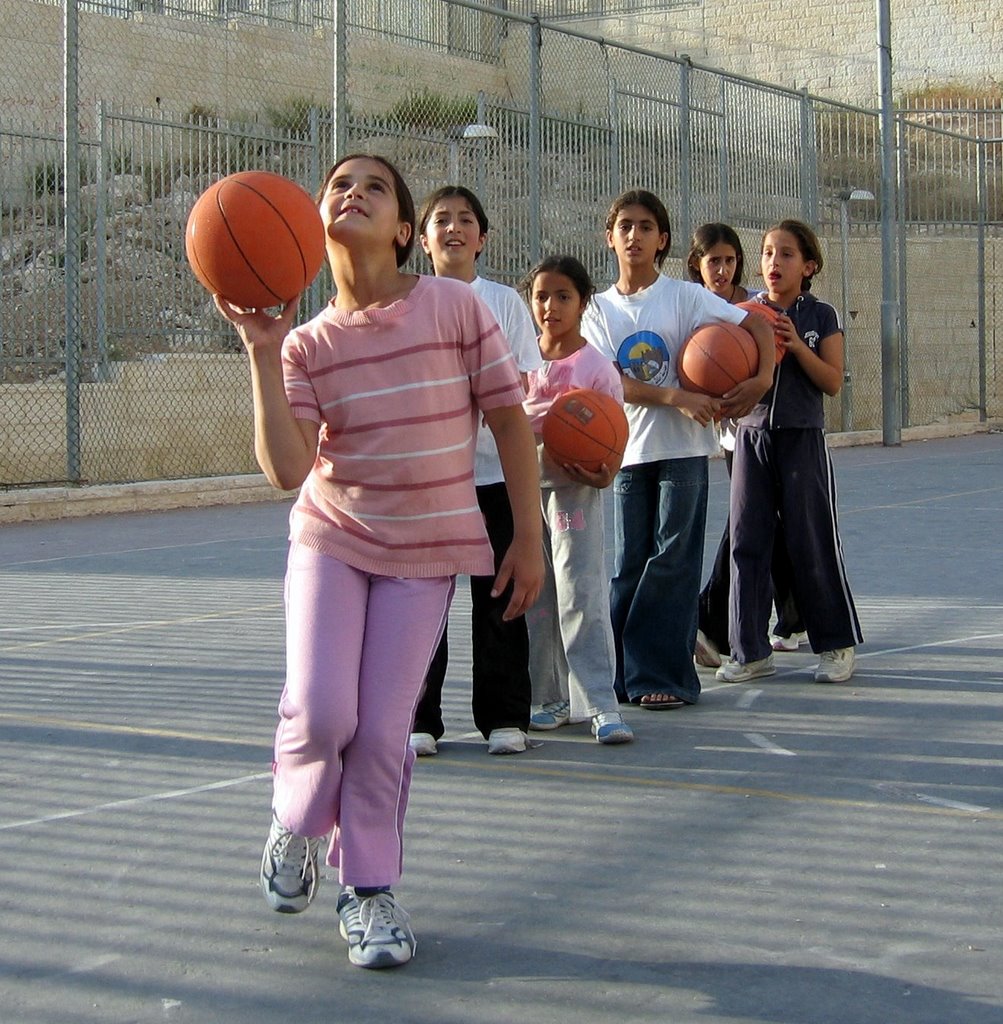
At the first practice some parents dropped their daughters off at the outdoor court in Esawiah and many came escorted by their younger brothers. I think many of the girls had never held a basketball before. We lined them up across from a partner and spent ten minutes going over bounce and chest passes. After fifteen more minutes of ball-handling and dribbling, I told them we would now shoot the basketball and learn how to make a lay-up. The girls burst into applause with gasps of anticipation and cheers of excitement. Such a small thing as shooting a lay-up was thrilling to them and their eagerness to learn something new made my day.
Basil and I are teaching them the basics of basketball starting with dribbling, passing, and the elusive footwork of a right-handed lay-up. During their first few practices, I was concerned about the appropriateness of taking pictures. Last week Basil said he thought it was okay and I took a few photos of some of the girls dribbling down the court. The next thing I know the girls on the otherside of the court are complaining to Basil that I wasn’t taking any photos of them dribbling. Everyone wants an action shot of them shooting and dribbling.
These 10, 11 & 12 year-old girls are having a blast learning about basketball and are some of the most eager players I have encountered yet.
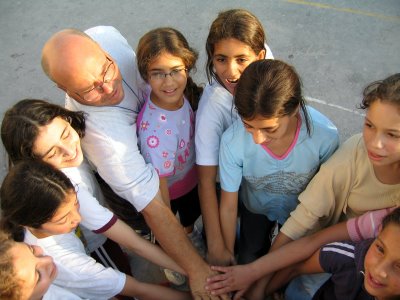
Middle East Update
November 20, 2006
During the last few weeks Playing for Peace held training seminars for our local coaches and North American program directors. These workshops were originally scheduled for August and September, but then there was a war going on and PfP’s future in Israel and Palestine was not as certain as it is today.
The coaches’ training provided the first opportunity of the year to bring all of PfP’s local coaches from across Israel and Palestine together. Everyone participated in two full days of bilingual (Arabic & Hebrew) classroom exercises and one night of pick-up hoops, drinks (many non-alcoholic), and dancing. The 30 Israeli and Palestinian coaches in attendance, both men and women, got to know one another and learned more about facilitating positive interactions between their Jewish and Arab players.
My story of the seminar starts in Hebron, where I go to pick up two of our local PfP coaches.
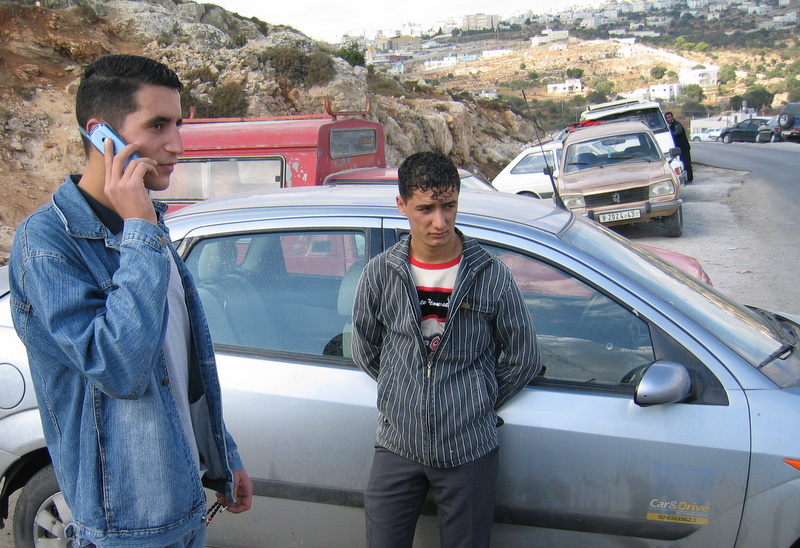
Quick background: PfP’s Arab coaches living in the West Bank require permission to enter Israel. All except three received permits, but half of those who did were not allowed to spend the night in Israel.
I arrive in Hebron at 9am in my Palestinian rental car and begin looking for the Tarqumiya checkpoint where our coaches are waiting. This is a lot easier said than done. Hebron, or Al-Khalil as it is known in Arabic, is the largest city in the West Bank, with a population of 170,000. Little do I know the Tarqumiya checkpoint is 20 minutes outside Hebron as I enter the city center and start asking for directions. My Arabic is at a level where I can clearly ask for directions but only understand half of the reply.
I pull up to a young man waiting on the side of the road. He responds to my question by opening the door and hopping into the passenger seat. With a smile he tells me to turn left. I gather he is heading the same way too and I am relieved to finally be on track. Relieved until ten minutes later, that is, when my cellphone loses its signal as we pass through a narrow valley outside the city with nothing but olive trees in sight. Not to worry though. My intuition about Bashir, my new friend, proves correct. He is an athlete too, a cyclist, and he even studied alongside our PfP coaches at Al-Khodori Sports College in Tulkarm. By 10am I am at the Tarqumiya checkpoint and meet our coaches. They are eager for the training seminar and for their first ever trip inside Israel. Just one problem. Our coaches have not yet picked up their permits from the DCO (District Coordinating Office), back on the other side of Hebron.
Pulling up to the DCO it becomes obvious that we will have to wait for a while. Several hundred people restlessly sit and stand outside the gates of the well-guarded Israeli permit office. We are told there are couple hundred more “humanitarian cases” already inside who are being priority processed for entry into Israel. Our coaches’ permits were approved the night before. We do not need to be processed, we just need to pick up the permits and go. But getting the soldiers’ attention and conveying this information to them is something of a challenge. The gates are locked and there is no one to speak with. Plus our coaches feel uncomfortable pushing their way through the mass of people to the front of the line. After waiting for two hours we decide to go and have lunch. When we return to the DCO the commander is outside with a few hundred Palestinians kneeling on the ground before him. He has our two permits in hand, we get them and go.
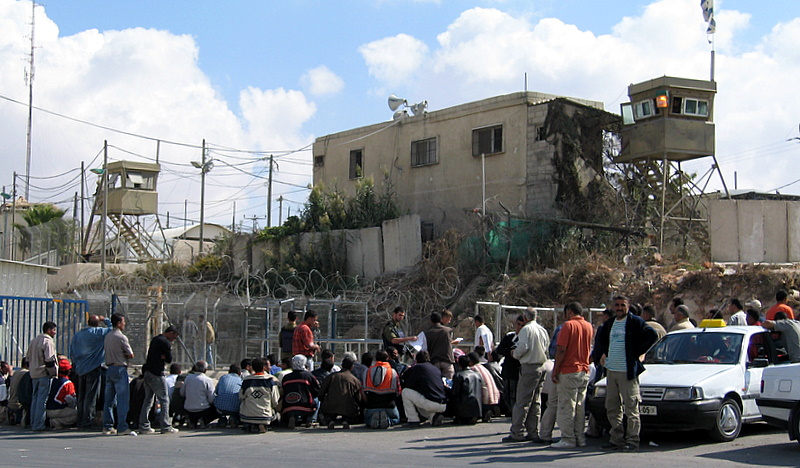
When the seminar ends I drive our coaches back to Hebron before their permits expire at 10pm. There is a good vibe in the car. Our coaches from the West Bank met many Jewish Israelis who, for the first time, were not soldiers. They had personal interactions with each other and saw a glimpse of the possibility and hope that defines PfP’s mission. As we approach Jerusalem we slow down to pass through a small checkpoint on the highway. Usually a soldier stands on the side of the road peering through windshields as cars slow down. In the 50 times I have previously gone through I have never been stopped.
The soldier “eyeballing” passing vehicles holds out his fist. We pull over to the side of the road. He asks us a few questions and takes my passport and their permits and ID cards. Fifteen minutes later he returns and says we will have to turn around and take another road. A twenty minute detour. The other road goes along the wall dividing East Jerusalem and Palestine. It is only partially paved—one section is dirt and an obstacle course of potholes. Ultimately the road leads to the same place, the center of Jerusalem, without any extra security checks. I ask the soldier why I can not drive on the highway, the road I take every day. He apologizes to me and says that I am allowed to drive on it, but that they, my Palestinian friends and coaches from the West Bank, are not.
As a staff we can only hope that the team building, techniques learned, and positive energy from this coaches’ training seminar and our future joint events outweigh the hurdles and humiliation faced by our Palestinian coaches.
